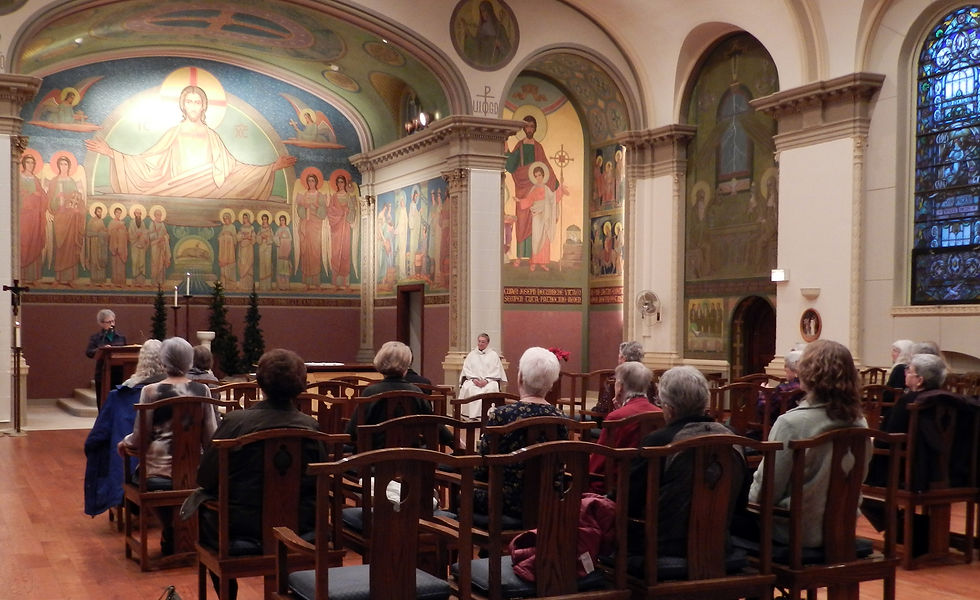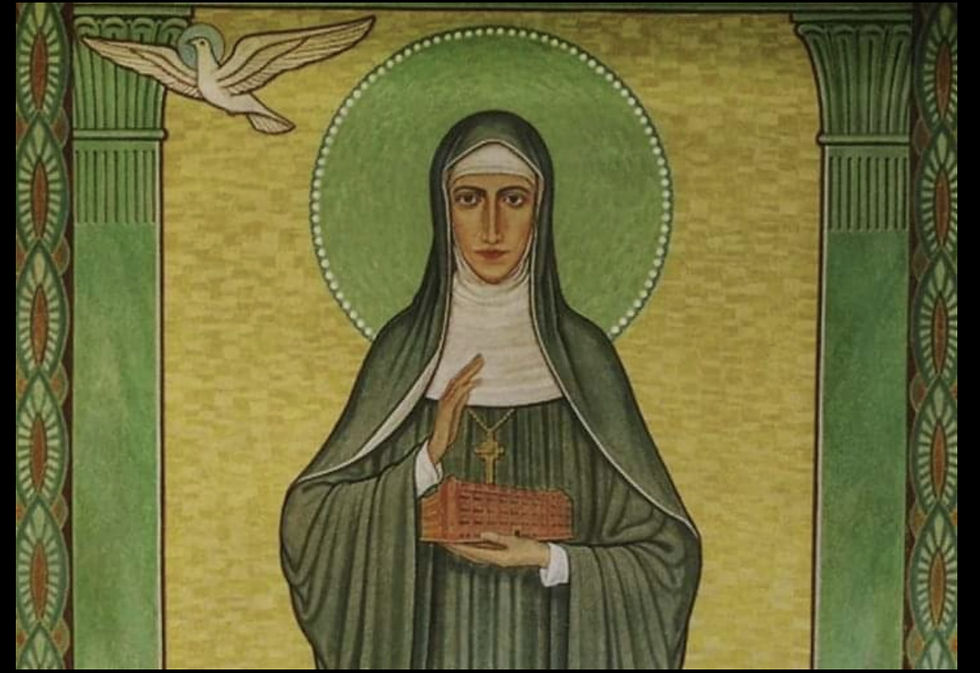On God and Love: Feast of St. Scholastica
- Benedictine Sisters of Chicago
- Feb 16, 2024
- 6 min read
By Susan Clark, with reflections from Mary Susan Remsgar, OSB
Dozens of oblates and friends gathered with the Sisters in the Chapel and on Zoom for the Feast of St. Scholastica Vigil. Prioress Sr. Mary Susan Remsgar’s reflections highlighted the theme of love throughout the readings and how much Scholastica and her twin brother Benedict loved each other and God.

Excerpted here, her full reflections are below:
“One of the things I believe Jesus offers us in this Gospel [Luke 10:38-42] is the reassurance of his loving presence no matter who we are, how we are, whether or not we meet our expectations or those of others. God is crazy about us, God is crazy in love with us. Jesus brings this unconditional, unshakeable, unrelenting love to each of us, every moment of every day, on our good days and especially on our bad days.
Such loving presence is the theme of the first reading in the Song of Songs [8:6-7] which is a collection of love poems reflecting a dialogue [which] necessitates mutual presence, listening and speaking the words of love…
St Scholastica, whom we celebrate today, was a lover. She loved and served God in her monastic community and she loved her brother, Benedict. We know the story of when she and her brother were together and Scholastica asked him to stay through the night so they could continue conversing. He refused because he was intent on following the rules… Scholastica prayed and God answered her prayer. Very simply yet profoundly, Scholastica shows us the power of being vulnerable with God and trusting in God’s faithful, transformative love.”
The closing hymn, with lyrics by the late Sr. Suzanne Zuercher, proclaims at the start, “Scholastica… with longing and with love, flew… to heaven like a dove.” And ends with a call to us to love, “May we bring to our daily tasks, love like yours for our world’s night.”
Happy Feast Day.

FEAST DAY REFLECTIONS
By Mary Susan Remsgar, OSB
I would like to begin my reflections this evening with our Gospel narrative recounting Jesus coming for dinner to the home of Martha and Mary who were dear friends of Jesus [Luke 10:38-42]. Although Lazarus, their brother, is not mentioned in this story, more than likely he is also present somewhere in the house or perhaps sitting outdoors as men often like to do when the women are busy inside. This particular Gospel story has been interpreted frequently as highlighting the need to balance active ministry or service with prayer and contemplation. Today, I want to take it in a little different direction.
Martha and Mary are sisters but as is sometimes the case, very different from one another. Martha seems to evidence characteristics of a Type A personality. She is quite focused on the job at hand, that of providing hospitality and preparing a meal for her dear friend. She is working hard at it and becomes frustrated, even irritated with her sibling, Mary, and with Jesus, too. Martha addresses Jesus, “Don’t you care that I am doing all the work? Tell my sister to help me.” Mary, on the other hand, appears to be easy going, peaceful, reflective, more in keeping with a Type B personality. Her relationship with Jesus seems to be more important to her than her sister’s expectations and the expectations of a traditional Jewish woman’s role in that culture. Sitting at the feet of the Rabbi, listening and learning was counter cultural behavior for a Jewish woman whose role was to do exactly what Martha was doing. It is curious when Jesus remarks that Mary has chosen the better part because Martha was really doing what she was supposed to be doing. What might we learn from Jesus’ interaction with Martha and Mary?
Both Martha and Mary and their brother, Lazarus, apparently had a very close relationship with Jesus who came to their home frequently. In another Gospel narrative recounting the death of Lazarus, Martha, in her grief, confronts Jesus. ”Where were you? If you had been here, my brother would not have died.” That’s a pretty heavy duty remark reflecting Martha’s hurt and anger. What does Jesus do? He cries, he shows his vulnerability, his love for Lazarus, and for the grieving sisters. Then Jesus uses his power by bringing Lazarus back to life. There is little doubt that these three siblings loved one another and loved Jesus and that Jesus loved them, spending time with them, eating with them, teaching them, resting with them. Martha’s relationship with Jesus is so strong, so deeply loving and trusting that she can be bold with Jesus. She tells him what she thinks, how she feels and what she needs. Jesus, too, relates honestly to Martha expressing his thoughts, but he does so with gentleness and sensitivity. When addressing Martha, Jesus speaks her name twice. One of the commentaries I read noted that when God in the Hebrew scriptures and Jesus in the New Testament repeat a person’s name, it indicates great tenderness and mercy for that person. Jesus is loving Martha, not judging her, not telling her to be other than she is. It may be that Jesus is simply reminding Martha that what is most precious in their relationship is the deep love and trust they have for one another. Mary seemed to be more aware of and responsive to this reality as she was attentive to Jesus’ presence while Martha was preoccupied, distracted and kind of overwhelmed in the situation and was not able to be truly present to Jesus. How often does it happen to us, too, that when we are stressed, frustrated, disappointed, discouraged, these experiences become vulnerable moments for us as they did for Martha. More often than not, I find myself like Martha, distracted, overwhelmed and distressed because I have lost my focus, my focus on the presence of Jesus. Yet at such times it also seems like Jesus draws even closer to us.
One of the things I believe Jesus offers us in this Gospel is the reassurance of his loving presence no matter who we are, how we are, whether or not we meet our expectations or those of others, God is crazy about us, God is crazy in love with us. Jesus brings this unconditional, unshakeable, unrelenting love to each of us, every moment of every day, on our good days and especially on our bad days. Such loving presence is the theme of the first reading in the Song of Songs [8:6-7] which is a collection of love poems reflecting a dialogue between lovers, between Jesus and each one of us. To be in dialogue necessitates mutual presence, listening and speaking the words of love. Using the language of human love, the book reflects the way God desires to be in the closest, most intimate relationship with us. God wants to know us and wants to be known by us.
In Paul’s letter to the young church in Corinth [2 Corinthians 10:17-11:2], he uses the image of marriage referencing God’s choice to love us by way of Jesus, the human expression, the Word of God’s love given in relational intimacy. Paul even goes so far as to speak of the jealously of God who yearns for our love. While God always takes the initiative with us, with loving us, God always awaits our response.
St Scholastica, whom we celebrate today, was a lover. She loved and served God in her monastic community and she loved her brother, Benedict. Although the details of her life are mostly unknown, we can surmise that she had an intimate relationship with God. We know the story of when she and her brother were together and Scholastica asked him to stay through the night so they could continue conversing. He refused because he was intent on following the rules. More than likely, he was perturbed with her for even asking such a thing. And she was probably unhappy with him for refusing her request. In this case, a bit of holy sibling rivalry. Scholastica prayed and God answered her prayer. Very simply yet profoundly, Scholastica shows us the power of being vulnerable with God and trusting in God’s faithful, transformative love.
We thank you, Scholastica, and we ask you to continue to help us to become true lovers in our families, in our Benedictine communities, in our Church and in our world which is so in need of deep healing, transformation and peace. We trust in your intercession for us this day and always. Amen.



